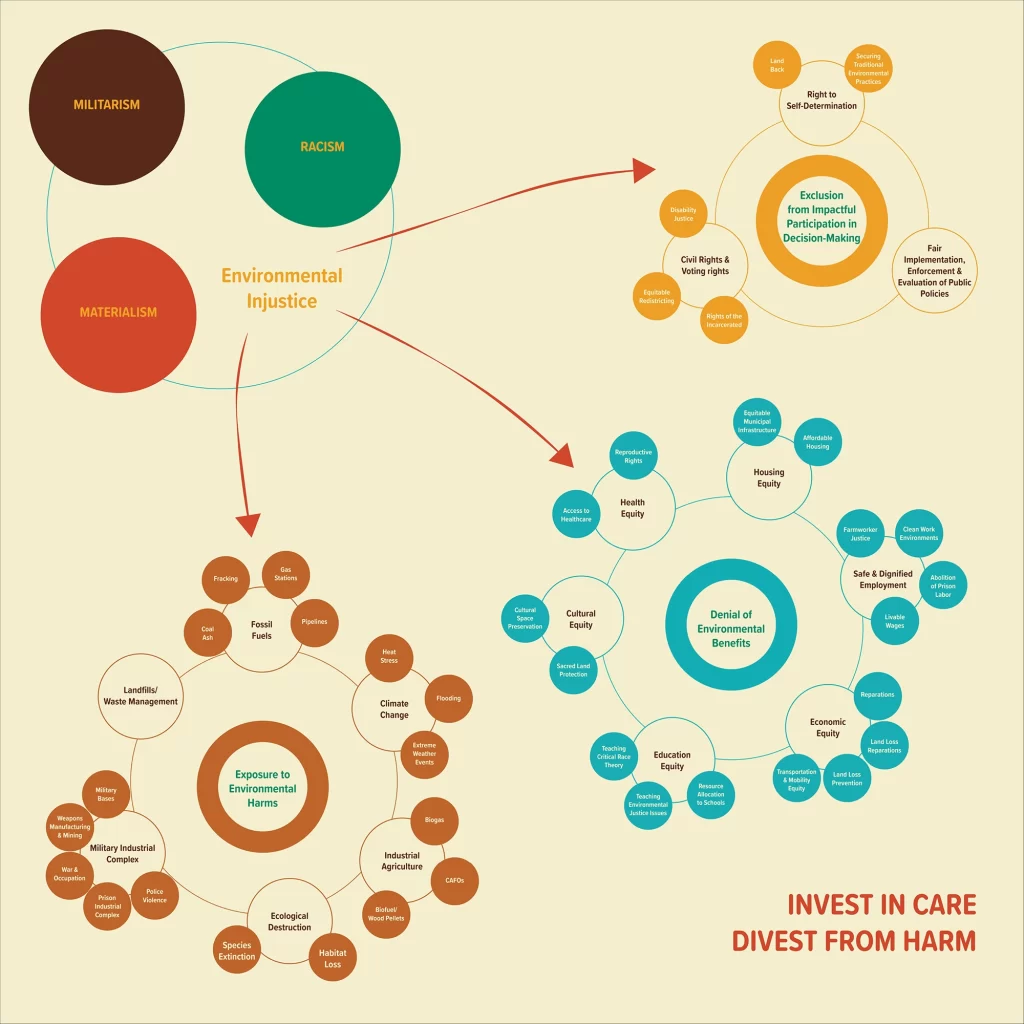
Environmental Injustices
What We Are Fighting Against
Fighting for Equality
Environmental justice addresses the unequal impact of pollution, climate change, and environmental degradation on marginalized communities. We fight against the systemic practices that disproportionately expose low-income and minority populations to harmful toxins, poor living conditions, and limited access to clean air, water, and land.
Our fight is grounded in the 17 Principles of Environmental Justice, created in 1991 at the People of Color Environmental Leadership Summit. These principles reject the capitalist system that sacrifices vulnerable communities and call for a more just and sustainable world.
We, at NCEJN, recognize and fight against systems of oppression, fueled by the root causes of environmental injustices and the intellectual theories that continue to justify frameworks that maintain these systems.
Our goal is to create equitable, sustainable solutions for all, where no community bears an unfair burden. We believe that no land or people are disposable, we strive to create policies that promote equity and justice for all, and we fight to stop environmental injustices and build a better world.

“Environmental racism has existed on this continent for 500 years. “One of the early extreme ideological differences that Native People in general had with the first European settlers was the way we view the environment and the way we view land. To indigenous people, the environment and the land are all connected. … There was an immediate conflict when settlers came here and saw indigenous people, the way we lived, and our land as things only for exploitation and development.”
– Wilma Mankiller, First National People of Color Environmental Leadership Summit – 1991

“We have been working on environmental issues for generations, if not centuries, as people of color from a variety of indigenous cultures that are still on these shores today.”
– Donna Chavis, First National People of Color Environmental Leadership Summit – 1991

Environmental justice is the “continuation of a struggle that is over 500 years old. This struggle has been against exploitation and systems of domination, whether by the military, the economic structure of capitalism, or the eco-genocidal nature of what we are facing today. If we are to dismantle the systems of domination, we have to understand the link, the correlation, the relationship between exploitation of land and the exploitation of people. The two are inseparable.”
– Robert D. Bullard, First National People of Color Environmental Leadership Summit – 1991

“You can’t have a system built on sacrificial places and sacrificial people unless intellectual theories that justify their sacrifice exist and persist—from Manifest Destiny to Terra Nullius to Orientalism, from backward hillbillies to backward Indians.”
– Naomi Klein, Let Them Drown – 2016

“For people of color, the environment is woven into an overall framework and understanding of social, racial, and economic justice. The definitions that emerge from the environmental justice movement led by people of color are deeply rooted in culture and spirituality and encompass all aspects of daily life—where we live, work, and play. This broad understanding of the environment is a context within which to address a variety of questions about militarism and defense, religious freedom and cultural survival, energy and sustainable development, transportation and housing, land and sovereignty rights, self-determination, and employment.”
– Dana Alston, The Summit: Transforming a Movement – 1991

Fighting the Root Causes of Environmental Injustice
Environmental injustice in the U.S. started with settler-colonialism, when land was stolen for profit, backed by military force, and justified by racism. Slavery, where people were taken and abused for profit, was another injustice. These injustices continue today through land theft against Indigenous communities, U.S.-funded settler-colonialism overseas in Palestine, and modern forms of slavery like mass incarceration and working poverty.
Martin Luther King, Jr. highlighted key contributors to environmental injustices in his 1963 “Letter from a Birmingham Jail,” where he identified the “three evils of society”: racism, materialism, and militarism.

“We as a nation must undergo a radical revolution of values. … When machines and computers, profit motives and property rights, are considered more important than people, the giant triplets of racism, extreme materialism, and militarism are incapable of being conquered.”
Martin Luther King Jr.
These giant triplets of racism, materialism, and militarism along with patriarchy and misogyny are fundamental causes of environmental injustices. They operate together, creating systems of oppression and domination that support continued environmental injustices.
Exposure to environmental harms, including:
- Ecological destruction (habitat loss, species extinction)
- Climate change (heat stress, flooding, extreme weather events)
- Industrial agriculture (CAFOs, wood pellets/biofuel, biogas)
- Landfills
- Fossil fuels (fracking, pipelines, coal ash, large gas stations)
- Militarization (weapons manufacturing, mining and transportation of resources, occupation, military bases, wars, police violence, prison industrial complex)
Denial of environmental benefits, including denial of:
- Housing rights (underbounding, affordable housing, flood zones)
- Health equity (reproductive justice, the golden hour)
- Cultural equity (indigenous burial sites)
- Safe and dignified employment (farmworker justice, workers’ rights, pollution in the workplace, working poverty, prison labor)
- Economic rights (reparations, land loss, transportation equity, and mobility justice)
- Education equity (teaching environmental justice issues and critical race theory, funding allocation to schools)
Exclusion from impactful participation in decision-making, including denial of:
- Civil and voting rights (disability justice, rights of the incarcerated, gerrymandering)
- Right to self-determination of all peoples, including Land Back
- Fair implementation, enforcement, and evaluation of public policies




















